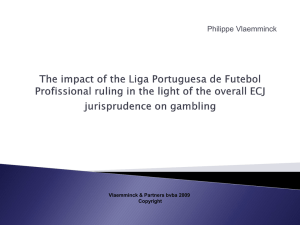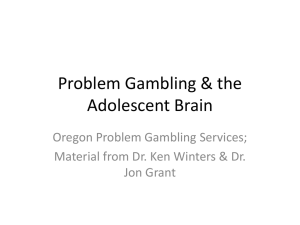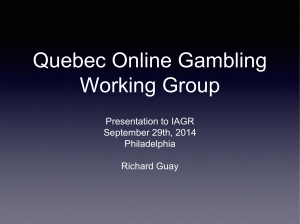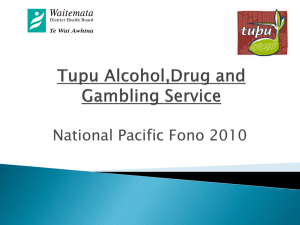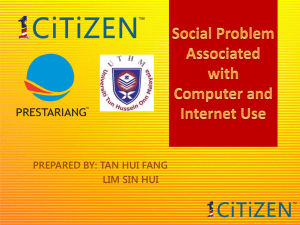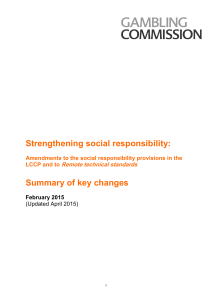GREF Lecture – 2015 – Slides
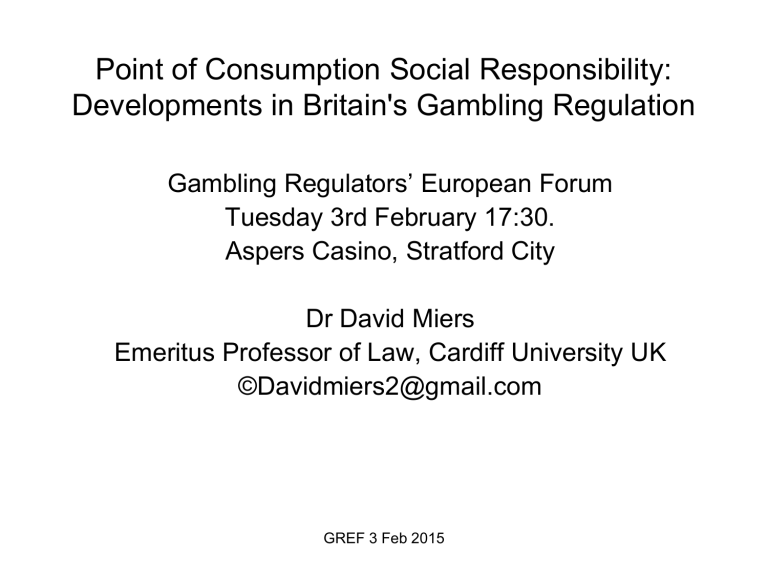
Point of Consumption Social Responsibility:
Developments in Britain's Gambling Regulation
Gambling Regulators’ European Forum
Tuesday 3rd February 17:30.
Aspers Casino, Stratford City
Dr David Miers
Emeritus Professor of Law, Cardiff University UK
©Davidmiers2@gmail.com
GREF 3 Feb 2015
Introduction
• The Gambling Commission’s approach to regulation and operators’ compliance with the LCCP.
• Background to and the scope of the Gambling
(Licensing and Advertising) Act 2014 .
• Structure and examples of the Commission’s current and proposed social responsibility code of practice
(the LCCP).
• Responsible Gambling Strategy Board: http://www.rgsb.org.uk/
• Responsible Gambling Trust: http://www.responsiblegamblingtrust.org.uk/
GREF 3 Feb 2015
The Commission’s approach to regulation and compliance 1
• A proportionate, risk based approach; a fair regulatory framework, with as little regulatory overhead as low as is consistent with public protection . The licensing objectives: a) preventing gambling from being a source of crime or disorder, being associated with crime or disorder or being used to support crime; b) ensuring that gambling is conducted in a fair an open way; and c) protecting children and other vulnerable persons from being harmed or exploited by gambling
• Risk to intangible values (eg. fair gambling transactions) not as easy to identify as physical harms (eg toxic waste / food)
• Assessment by reference to ‘likelihood of risk’ and to potential impact
.
GREF 3 Feb 2015
The Commission’s approach to regulation and compliance 2
• Compliance: the responsibility of each operator’s senior management rather than of the regulator
• Good governance: issue is not whether all operators in a particular sector adopt the same approach but what steps this operator has taken to embed the
LCCP’s objectives throughout its organisation
• A direct and proactive approach with the industry
• Expectation that applicants and licence holders will work with it ‘in an open and cooperative way’
• ‘Earned autonomy’
GREF 3 Feb 2015
Gambling (Licensing and Advertising) Act 2014 into force 1
st
November 2014
Two explicit DCMS / GC drivers
– consumer protection measures for all British based consumers of remote gambling
– A level playing field for all remote operators
Many different consumer protection arrangements and different regulators, depending on point of supply; and new operators unknown to GC. Also, unfair to GB-licensed gambling operators that overseas competitors benefit from access to the GB market without bearing a fair share of the costs of regulation, or of research, education and treatment of problem gambling. A level playing field is important for player/consumer protection purposes by seeking to prevent undercutting by irresponsible operators.
Treasury drivers: Point of consumption: capturing all remote profits; a level tax playing field
GREF 3 Feb 2015
The new law: s 36(3) Gambling Act 2005
S. 36(3) now provides that a provider of gambling facilities requires an operating licence if (a) a piece of
‘remote gambling equipment’ is located in GB (this is the existing) OR (b) the facilities are to be used in GB.
BUT s.36(3)(b) only applies if the provider ‘knows or should know’ that they are likely to be used in GB.
This extension applies to all remote operators in the EU, the EEA, Gibraltar, and the ‘white-listed’ countries; but will in effect catch them only if they are aiming to transact with GB consumers.
GREF 3 Feb 2015
The Gambling Commission’s social responsibility code
• 2005 Act both obliges and permits the Commission to issue codes of practice about the manner in which gambling facilities are provided.
• ‘fair and open’ gambling (LO2); protecting children and other vulnerable persons (LO3); making assistance available to persons affected by problems related to gambling.
• Ordinary and Social responsibility provisions: LCCP Part II
• Regulatory and criminal sanctions
• SR provision 3.1.1 provides that ‘all licensees ‘must have and put into effect policies and procedures intended to promote socially responsible gambling’.
• EC 2014 Recommendation / RGA
GREF 3 Feb 2015
Self exclusion
• LCCP Part II 3.5.1 / 3.5.3: remote and non-remote operators must ‘have and put into effect procedures for self-exclusion and take all reasonable steps to refuse service or to otherwise prevent an individual who has entered a self-exclusion agreement from participating in gambling (EC Articles 29, 32)
• Easier for account based facilities: LCCP proposal for new SR provision: all remote licensees must participate in MOSES: multi-operator self-exclusion schemes (EC Articles 37, 38)
• Longer time line for bricks and mortar (new SR provisions): (1) self-exclusion by sector ; (2) self-exclusion cross-sector
• LCCP: SR and OR (3.5.2 / 3.5.4) provisions on account closures
/ marketing / re-opening (EC Articles 34, 35)
GREF 3 Feb 2015
Time out and budgetary / time control
• Minimum self exclusion 6 months: LCCP II OR to become an
SR provision (EC Article 33(b))
• LCCP consultation: a proposed SR provision for a 24 hour / one week / one month time out (EC Articles 29, 33(a))
• Commission’s Remote Technical Standards (RTS): operators must provide facilities to assist customers to stick to budgets, to emend them, and easily accessible information about current balances (EC Articles 24, 25, 29). There are also proposals to amend RTS 12 to require operators to offer customers to set financial limits for periods of 24 hours, 7 days or a month.
GREF 3 Feb 2015
Customer interaction 1
• LCCP SR 3.4.1: Licensees must put into effect policies and procedures where they have concerns that a customer’s behaviour may indicate harm (or risk of harm) as a result of their gambling behaviour (EC Article 30).
• RTS 13 : remote operators’ client applications must display the time of day or the elapsed time since the application was started.
• Proposed new RTS provision: must provide easily accessible facilities that make it possible for customers to set a frequency at which they will receive and see on the screen a reality check within a gaming session. Customer must acknowledge the reality check for it to be removed from the screen. (RTS 13B;
EC Articles 26, 27).
GREF 3 Feb 2015
Customer interaction 2
• LCCP II SR 3.3.1: Information on how to gamble responsibly and help for problem gamblers (EC Articles 4(c)-(d))
• Questionable impact: RTP
• Targeted instead of general messaging: identifying the player by reference to their patterns of play.
• Is it possible to distinguish between harmful and non-harmful play? RGT commissioned work
• Account based play: loyalty cards
• DCMS 2014: concern about B2 gaming machines: obligation on larger bookmaking operators to provide accounts, or counter transactions for +£50 bets (reality check)
GREF 3 Feb 2015
Conclusions 1: the Recommendation
• Current and proposed provisions : GB well on course
• Subject to the LCCP etc, all remote operators licensed by GC are subject to a universal and uniform set of CP / social responsibility standards, which is
(a) good for British consumers, who know where they stand whatever site they are using, and
(b) permits GC more effectively to deal with consumer complaints.
• Harmonisation-lite: EC Recommendation useful as a check list of good practice for GC and other regulators
GREF 3 Feb 2015
Conclusions 2: operators and players
• Operators
– sanctions: licence review, penalties up to revocation: commercial risk
– incentives: compliant behaviour is more likely to conduce to a regulatory environment in which they can pursue their commercial well-being.
• Players: may be informed but do they act?
– mandatory account based play: trade-off between recreational gamblers’ present ability to place a bet as and when they wish and the political decision to constrain that liberty in order to minimise harm to the small numbers for whom gambling presents a risk of harm.
GREF 3 Feb 2015
